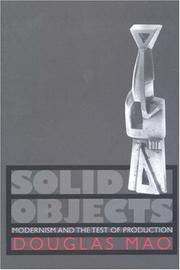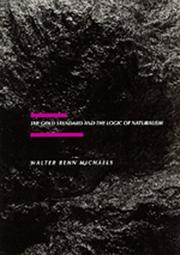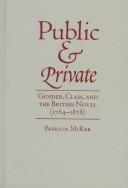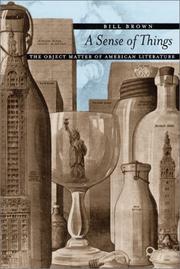| Listing 1 - 5 of 5 |
Sort by
|

ISBN: 0691059268 9786612753534 140082270X 1282753533 1400812593 9781400812592 9780691059266 1400805082 Year: 1998 Publisher: Princeton, N.J. Princeton University Press
Abstract | Keywords | Export | Availability | Bookmark
 Loading...
Loading...Choose an application
- Reference Manager
- EndNote
- RefWorks (Direct export to RefWorks)
In this provocative and wide-ranging study, Douglas Mao argues that a profound tension between veneration of human production and anxiety about production's dangers lay at the heart of literary modernism. Focusing on the work of Virginia Woolf, Wyndham Lewis, Ezra Pound, and Wallace Stevens, Mao shows that modernists were captivated by physical objects, which, regarded as objects, seemed to partake of a utopian serenity beyond the reach of human ideological conflicts. Under a variety of historical pressures, Mao observes, these writers came to revere the making of such things, and especially the crafting of the work of art, as the surest guarantee of meaning for an individual life. Yet they also found troubling contradictions here, since any kind of making, be it handicraft or mass production, could also be understood as a violation of the nonhuman world by an increasingly predatory and imperialistic subjectivity. If modernists began by embracing production as a test of meaning, then they frequently ended by testing production itself and finding it wanting. To make this case, Mao interweaves social and political history with readings in literature, the visual arts, philosophy, and economics. He explores modernism's relation to aestheticism, existentialism, and the culture of consumption, joining current debates on the politics of engagement and the social meanings of art. And he shows conclusively, in this elegantly written and consistently surprising work, that we cannot understand the theories and practices of modernism without addressing the question of the object and production's ambivalent allure.
European literature --- Material culture in literature. --- Material culture --- Modernism (Literature). --- Production (Economic theory) in literature. --- History and criticism. --- Modernism (Literature) --- Crepuscolarismo --- Culture --- Folklore --- Technology --- Literary movements --- Postmodernism (Literature)
Book
ISBN: 9781587431951 Year: 2008 Publisher: Grand Rapids (Mich.) : Brazos press,
Abstract | Keywords | Export | Availability | Bookmark
 Loading...
Loading...Choose an application
- Reference Manager
- EndNote
- RefWorks (Direct export to RefWorks)

ISBN: 0520908295 1282355295 9786612355295 0585161216 9780520908291 9780585161211 0520059816 9780520059818 0520059824 9780520059825 9781282355293 Year: 1987 Publisher: Berkeley University of California Press
Abstract | Keywords | Export | Availability | Bookmark
 Loading...
Loading...Choose an application
- Reference Manager
- EndNote
- RefWorks (Direct export to RefWorks)
The Gold Standard and the Logic of Naturalism discusses ways of creating value in turn-of-the-century American capitalism. Focusing on such topics as the alienation of property, the invention of masochism, and the battle over free silver, it examines the participation of cultural forms in these phenomena. It imagines a literary history that must at the same time be social, economic, and legal; and it imagines a literature that, to be understood at all, must be understood both as a producer and a product of market capitalism.
Historicism. --- Economics in literature. --- Capitalism and literature. --- Consumption (Economics) in literature. --- Production (Economic theory) in literature. --- Naturalism in literature. --- American fiction --- History --- Literature and capitalism --- Literature --- History and criticism. --- Philosophy --- Capitalism and literature --- Consumption (Economics) in literature --- Economics in literature --- Historicism --- Naturalism in literature --- Production (Economic theory) in literature --- History and criticism --- academic. --- american capitalism. --- american culture. --- american history. --- american literature. --- capitalism. --- capitalist. --- contract. --- corporate. --- culture. --- economics. --- economy. --- finance. --- legal issues. --- literary history. --- literature. --- market capitalism. --- masochism. --- money. --- naturalism. --- popular economy. --- property. --- real estate. --- scholarly. --- social studies. --- turn of the century. --- us history. --- AMERICAN FICTION --- NATURALISM IN LITERATURE --- CONSUMPTION (ECONOMICS) IN LITERATURE --- CAPITALISM AND LITERATURE --- 20th CENTURY

ISBN: 0816629358 9780816629350 081662934X 9780816629343 0816688036 Year: 1997 Publisher: Minneapolis ; London University of Minnesota Press
Abstract | Keywords | Export | Availability | Bookmark
 Loading...
Loading...Choose an application
- Reference Manager
- EndNote
- RefWorks (Direct export to RefWorks)
Classes sociales dans la littérature --- Consommation (Economie politique) dans la littérature --- Consumptie (Economie) in de literatuur --- Consumption (Economics) in literature --- Problèmes sociaux dans la littérature --- Productie (Economische theorie) in literatuur --- Production (Economic theory) in literature --- Production (Théorie économique) in littérature --- Rôle selon le sexe dans la littérature --- Seksuele rolpatronen in de literatuur --- Sex role in literature --- Social classes in literature --- Social problems in literature --- Sociale klassen in de literatuur --- Sociale problemen in de literatuur --- Verbruik (Economie) in de literatuur --- Capitalism and literature --- Consumption (Economics) in literature. --- English fiction --- Literature and society --- Privacy in literature. --- Production (Economic theory) in literature. --- Public opinion in literature. --- Sex role in literature. --- Social classes in literature. --- Social problems in literature. --- History. --- History and criticism. --- History --- History and criticism --- 19th century --- Great Britain --- 18th century

ISBN: 0226076288 0226076296 9780226076294 Year: 2003 Publisher: Chicago, IL : University of Chicago Press,
Abstract | Keywords | Export | Availability | Bookmark
 Loading...
Loading...Choose an application
- Reference Manager
- EndNote
- RefWorks (Direct export to RefWorks)
"Brown's new study explores the roots of modern America's fascination with things and the problem that objects posed for American literature at the turn of the century. This was an era when the invention, production, distribution, and consumption of things suddenly came to define a national culture. Brown shows how crucial novels of the time made things not a solution to problems, but problems in their own right. Writers such as Mark Twain, Frank Norris, Sarah Orne Jewett, and Henry James ask why and how we use objects to make meaning, to make or remake ourselves, to organize our anxieties and affections, to sublimate our fears, and to shape our wildest dreams. Offering a remarkably new way to think about materialism. A Sense of Things will be essential reading for anyone interested in American literature and culture."--Jacket.
Consommation (Economie politique) dans la littérature --- Consumptie (Economie) in de literatuur --- Consumption (Economics) in literature --- Culture matérielle dans la littérature --- Material culture in literature --- Materiële cultuur in de literatuur --- Possessiveness in literature --- Productie (Economische theorie) in literatuur --- Production (Economic theory) in literature --- Production (Théorie économique) in littérature --- Verbruik (Economie) in de literatuur --- American fiction --- Consumption (Economics) in literature. --- Economics and literature --- Material culture in literature. --- Material culture --- Possessiveness in literature. --- Production (Economic theory) in literature. --- History and criticism. --- History --- 93/94 --- 930.8 --- 8 --- Amerika --- Verenigde Staten --- Culture --- Folklore --- Technology --- Literature --- Literature and economics --- Geschiedenis --- Cultuurgeschiedenis --- Cultuur (geschiedenis) --- Literatuur --- Economic aspects --- History and criticism --- 19th century --- United States --- AMERICAN FICTION --- MATERIAL CULTURE --- ECONOMICS AND LITERATURE --- POSSESSIVENESS IN LITERATURE --- 19th CENTURY --- U.S.
| Listing 1 - 5 of 5 |
Sort by
|

 Search
Search Feedback
Feedback About UniCat
About UniCat  Help
Help News
News